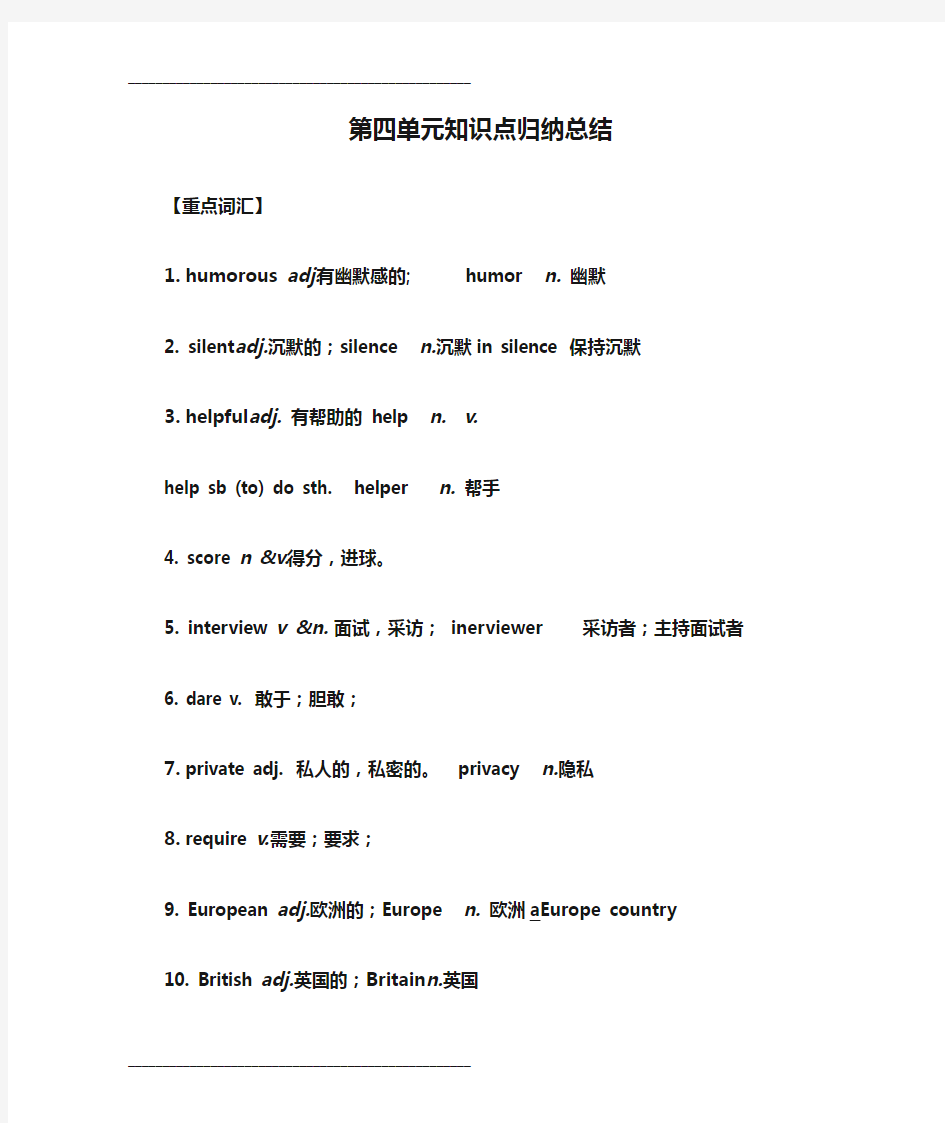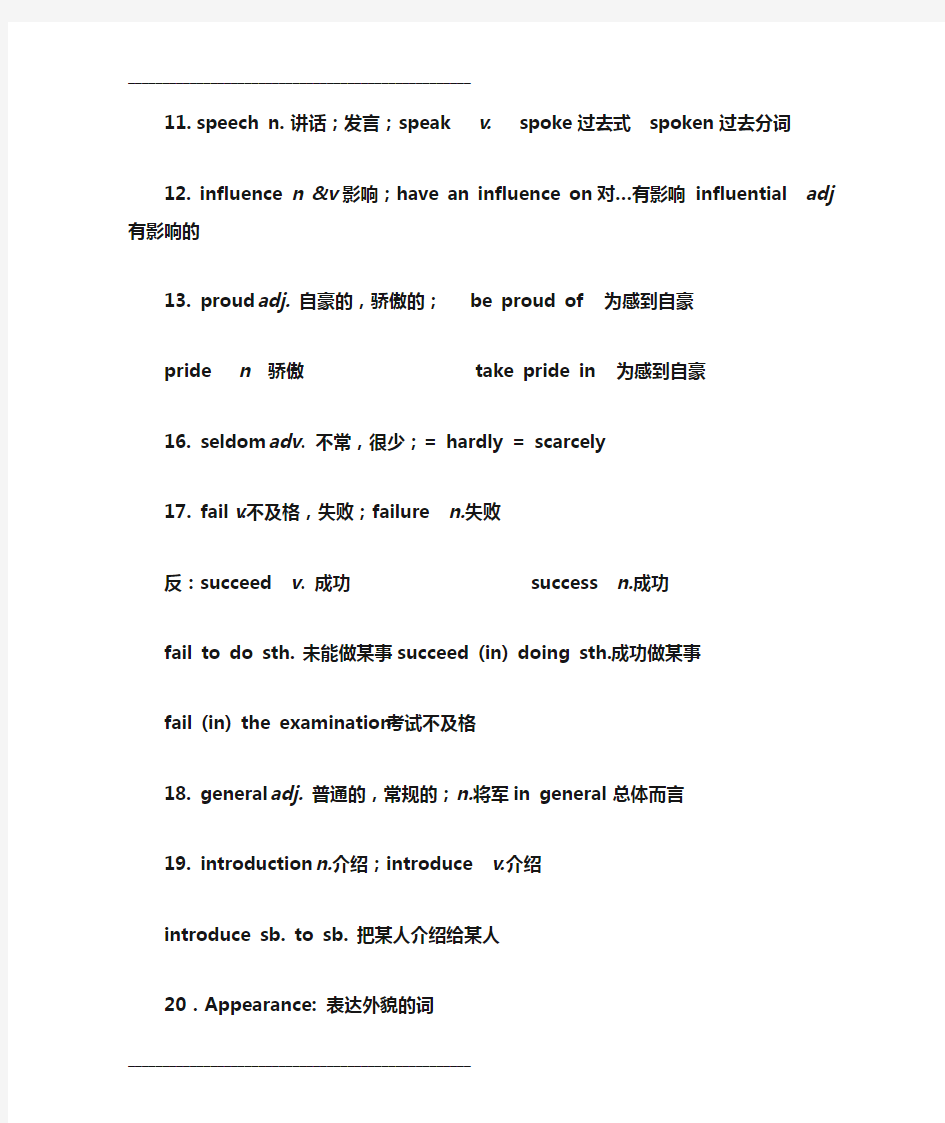

第四单元知识点归纳总结
【重点词汇】
1.humorous adj.有幽默感的; humor n. 幽默
2. silent adj.沉默的;silence n.沉默in silence 保持沉默
3.helpful adj. 有帮助的help n. v.
help sb (to) do sth. helper n. 帮手
4. score n &v.得分,进球。
5. interview v &n. 面试,采访;inerviewer 采访者;主持面试者
6. dare v. 敢于;胆敢;
7.private adj. 私人的,私密的。privacy n.隐私
8.require v.需要;要求;
9. European adj.欧洲的;Europe n. 欧洲aEurope country
10. British adj.英国的;Britain n.英国
11.speech n. 讲话;发言;speak v.spoke过去式spoken过去分词
12. influence n &v影响;have an influence on对…有影响influential adj有影
响的
13. proud adj. 自豪的,骄傲的;be proud of 为感到自豪
pride n 骄傲take pride in 为感到自豪
16. seldom adv. 不常,很少;= hardly = scarcely
17. fail v.不及格,失败;failure n.失败
反:succeed v. 成功success n.成功
fail to do sth. 未能做某事succeed (in) doing sth. 成功做某事
fail (in) the examination考试不及格
18. general adj. 普通的,常规的;n.将军in general 总体而言
19. introduction n.介绍;introduce v.介绍
introduce sb. to sb. 把某人介绍给某人
20.Appearance: 表达外貌的词
tall, short, fat, thin, young, old, straight hair, curly hair, long hair, short hair, medium build, medium hight
21.Personality: 表达性格的词
outgoing, serious, funny, smart, friendly, shy, unfriendly, quiet happy, 22.u sed to 过去常常,以前常常情态动词
used to + 动词原形
表示过去的习惯或过去经常反复发生的动作或状态(现在已
经不再存在)。只有一种式,即过去式。没有人称和数的变化。
句式:肯定句:I used to be afraid of the dark.
否定句:I didn’t use to be afraid of the dark.
疑问句:Did you afraid of the dark?
答语:Yes, I did. No, I didn’t.
be used to do sth 表示“被用来做某事”,是被动结构,强调主语是动词use 的承受者。
Stamps can be used to send letters. 邮票可用来寄信。
be used to doing sth 意为“习惯于做某事”,其中to是介词,后须接名词或动词-ing形式。
I was used to the hard life here. 我习惯这里的艰苦生活。
He is used to working before six in the morning.
be used for doing sth. 被用来做某事
Coal is used for producing electricity. 煤被用来发电
be used as 被当做…使用
Pens are used as weapons by LuXun. 笔被鲁迅当作武器使用
23.be afraid of sth. 惧怕某物be afraid to do sth. 惧怕做某事
24.f rom time to time时常25. get good scores 取得好的分数
26. deal with对付,应对dealt过去式dealt 过去分词(与how联用)
同义词:do with(与what联用)
27. get tons of attention得到大量的关注
28. be interested in对……感兴趣
=show/take/have/feel (an) interest in,其中interest为名词,意为“兴趣”。
29. interesting & interest
1). interesting
意为“有趣的”,常用来修饰物。
Eg: The story is very interesting. 这故事很有趣。
This is an interesting book. 这是本有趣的书。
2). interest
不可数名词,意为“兴趣、趣味”。作动词时意为“使(人)发生兴趣”,其主语多为事物。Eg:
They're all places of great interest in China. 它们都是中国的名胜。
Your story interests me. 你的经历引起了我的兴趣。
29.Africa n.非洲African adj 非洲的African culture非洲文化
Asia n. 亚洲Asian adj 亚洲的
30. be alone 独处
31.d are既可实义动词,以可做情态助动词。意思是:“敢,敢于”
He doesn’t dare to go out alone at night. 句中dare是实义动词,因为一方面后接了带to的不定式,另一方面前面加了助动词does.
He dare not go out alone at night. 句中为助动词。
32. give a speech (in public)做一个(公开)演讲
33. be nervous about tests对考试感到紧张
34. absent adj. 缺席;不在absence n. 缺席
be absent from classes逃课
35. decide v. 决定decision n. 决定
decide to do sth. 决定做某事make a decision下决心
36. talk with sb in person亲自找某人谈话
37. to one’ surprise令某人惊讶的是to one’s joy 令某人高兴的是
to one’s regret 令某人遗憾是to one’s sorrow令某人悲伤的
to one’s excitement 令某人兴奋的是
38. feel good about oneself对自己充满信心
39. a general self-introduction 一个简要的自我介绍
40. in the last few years 在最近几年
41. shy adj. 害羞的,腼腆的shyness n.害羞, 腼腆
42. crowd n. v. 人群, 观众;拥挤crowded adj. 拥挤的
crowds of 一群群的…
43. tons of大量的修饰不可数名词tons of attention / money /work
44. person n. personal adj. 个人的
in person 亲自
45. do well in = be good at 表现出色46. cause problems惹麻烦
47. move to搬到地方48. look for寻找
49. take care of = look after照顾,照料50. begin to do sth.开始做某事
51. become less interested in变得对…不太感兴趣
52. finally= in the end =at last 最后
53communicate v.交流communication n. 交流
have communication with sb. 与某人交流
54. take up 开始从事…
55. give up 放弃give out分发;耗尽;筋疲力尽give off 发出(气味等)
give in 屈服;让步give away 赠送;泄露
56.at least 至少at most最多
57.in public 公开地;在别人面前
42. a great deal of/ a large amount of 大量的修饰不可数名词
a large number of 许多,大量修饰可数名词复数
lots of / a lot of/plenty of/ a large quantity of 许多,大量修饰可数名词以及不可数名词
43. remain用法较为复杂,将remain的用法归纳如下:i)用作联系动词,指某人或某事物仍保持某种状态,意为“仍然;依旧”,“留;呆;住;待”,后面可接名词、代词、形容词、介词短语、分词作表语。
1. 接名词作表语Peter became a manager, but Jack remained a worker. 彼得成为了一个经
理,而杰克仍然是个工人。It remained a secret. 这仍然是个秘密。2. 接形容词作表语Whatever achievements you’ve made, you sho uld remain modest. 无论你取
得多么大的成就,你都该保持谦虚。
He remains silent 保持沉默 3. 接介词短语作表语He had to remain in hospital until he was better. 他不得不一直住院直到身体
好些。4. 接分词作表语接过去分词作表语,表示主语所处的状态或已经发生的被动动作;现在分词作
表语,表示正在进行的主动动作。The guests came in, but she remained sitting at the desk reading.客人们都来了,但她还坐在写字台旁读书。As before, he remained unmoved. 他和以往一样无动于衷。
ii)用作不及物动词,意思是“剩下;剩余;遗留”,此时不能用进行时态,也没有被动语态
If you take 3 from 8, 5 remains. 8减3剩5
After the fire, very little remained of his house. 火灾过后,他的家所剩无几
【重点句式】
1. ---You used to be short, didn’t you? ---Yes, I did. ---你过去个子矮,是吗?---
是的,我是。
3. Paula used to be really quiet, she was never brave enough to ask questions. 波拉以前很文静,她从来不够勇敢来问题。
4. It’s three years since we last saw our primary school classmates. 自从我们上次见到我们的初中同学以来已有三年了。
5. Emily didn’t use to eat a lot of vegetables, but now she loves carrots and tomatoes.
艾米丽过去不吃许多蔬菜,但是现在她喜爱胡萝卜和西红柿。
6. ----I used to be nervous about tests all the time. What about you? ---Yes, me too. And I used to hate P.E class.
--我以前对考试一直感到紧张,你呢?---是的,我也是。并且我过去还讨厌上体育课。7. My life has changed a lot in the last few years.我的生活在近几年改变了许多。
Section A(1a ~ 2d)
https://www.doczj.com/doc/cc16837631.html,ed to do sth 意为“过去常常做某事”,特指在过去经常发生的动作,而现在已不再发生,其中used to 可以看作情态动词,用于各种人称。He used to play soccer when he was young.
他年轻时经常踢足球。(现在不踢了)
She used to be an English teacher.
她过去是一位英语老师。(现在不是英语老师了)
1).其否定句为didn’t use to do或used not to do,used not可缩写为
usedn’t。
Mr. Li didn’t use to drink beer. =Mr. Li usedn’t to drink beer.
2). used to 的疑问句形式是“https://www.doczj.com/doc/cc16837631.html,e to do?”或“Used…to do”。
Did she use to get up early?=Used he to get up early?
3). used to 的反意疑问句也用助动词did(n’t)或used(n’t)构成。
Mario used to be late for school, didn’t/usedn’t he?
【联系拓展】be used to do sth & be used to doing sth.
.